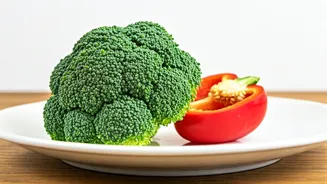Understanding Fatty Liver
Fatty liver disease is marked by an accumulation of fat in the liver cells. This condition can be triggered by various factors, including excessive alcohol
consumption, obesity, and poor dietary habits. There are two main types of fatty liver disease: non-alcoholic fatty liver disease (NAFLD), which is not caused by alcohol, and alcoholic fatty liver disease (AFLD), which is associated with alcohol use. NAFLD is particularly widespread and linked to conditions like diabetes and high cholesterol. The buildup of fat can lead to inflammation and damage the liver over time, potentially causing more severe conditions such as cirrhosis or liver failure. Recognizing the early signs and taking preventive measures are key to managing this condition effectively. Lifestyle changes, including dietary adjustments, exercise, and weight management, are often the first lines of treatment.
Benefits of Cruciferous Veggies
Cruciferous vegetables, such as broccoli, cauliflower, and Brussels sprouts, are crucial for liver health. They are rich in glucosinolates, sulfur-containing compounds, which are known for their detoxification properties. When broken down, these compounds create substances that can assist the liver in eliminating toxins. Consuming these veggies can improve the detoxification process, reducing the burden on the liver and minimizing inflammation. Moreover, cruciferous vegetables are high in fiber, which helps regulate blood sugar levels, a significant factor in managing fatty liver disease. Including these vegetables regularly in your diet can provide the liver with the necessary support to function efficiently and help in the healing process.
Leafy Greens for Detox
Leafy green vegetables, including spinach, kale, and collard greens, are packed with essential nutrients and antioxidants that are vital for liver health. These greens are full of chlorophyll, a pigment that supports the removal of toxins from the body. They are also good sources of vitamins and minerals, like vitamin K, which assists in liver function and helps in the production of clotting factors. The high fiber content in these greens can help improve digestion and reduce the accumulation of fat in the liver. Regularly incorporating leafy greens into meals can boost the liver's natural detoxification processes, contributing to its overall well-being and reducing the risks associated with fatty liver disease.
Beets for Liver Support
Beets are known for their ability to support liver function, making them a valuable addition to a liver-friendly diet. They contain betaine, a compound that helps protect the liver from oxidative stress and inflammation. Beets can help reduce the fat deposits in the liver and improve its overall function. They are also packed with antioxidants that combat free radicals, which can damage liver cells. Consuming beets can stimulate bile production, which aids in digestion and helps the liver eliminate waste products. Regular consumption of beets or beet juice can significantly aid in managing and healing fatty liver disease by promoting liver health and reducing the burden on this vital organ.
Garlic's Liver-Healing Power
Garlic contains several compounds that are beneficial for liver health, particularly allicin, which has potent antioxidant and anti-inflammatory properties. Allicin helps protect the liver from damage and oxidative stress, helping reduce inflammation. Garlic helps in detoxifying the liver by activating liver enzymes, which supports the elimination of toxins. Moreover, garlic can help lower cholesterol and triglyceride levels, crucial in managing fatty liver disease. Including garlic in your diet can support overall liver health and assist in the healing process. Adding garlic to your meals frequently is a straightforward way to harness its potent benefits for liver well-being.
Citrus Fruits Boost
Citrus fruits like lemons and grapefruits are beneficial for liver health. They contain high levels of vitamin C and antioxidants that help protect the liver from damage. These fruits also aid in detoxification by increasing the production of enzymes that help remove harmful substances. Citrus fruits assist in the process of breaking down fats and reducing the load on the liver, and their high fiber content helps regulate blood sugar levels, which is important for those with fatty liver disease. Eating citrus fruits or drinking their juice can help improve liver function. However, it's important to note that those with existing stomach issues should consume citrus fruits in moderation to avoid potential discomfort.














